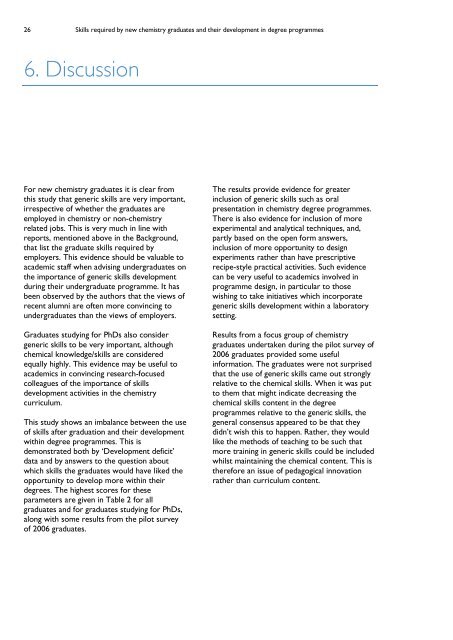Skills required by new chemistry graduates - Higher Education ...
Skills required by new chemistry graduates - Higher Education ...
Skills required by new chemistry graduates - Higher Education ...
Create successful ePaper yourself
Turn your PDF publications into a flip-book with our unique Google optimized e-Paper software.
26 <strong>Skills</strong> <strong>required</strong> <strong>by</strong> <strong>new</strong> <strong>chemistry</strong> <strong>graduates</strong> and their development in degree programmes<br />
6. Discussion<br />
For <strong>new</strong> <strong>chemistry</strong> <strong>graduates</strong> it is clear from<br />
this study that generic skills are very important,<br />
irrespective of whether the <strong>graduates</strong> are<br />
employed in <strong>chemistry</strong> or non-<strong>chemistry</strong><br />
related jobs. This is very much in line with<br />
reports, mentioned above in the Background,<br />
that list the graduate skills <strong>required</strong> <strong>by</strong><br />
employers. This evidence should be valuable to<br />
academic staff when advising under<strong>graduates</strong> on<br />
the importance of generic skills development<br />
during their undergraduate programme. It has<br />
been observed <strong>by</strong> the authors that the views of<br />
recent alumni are often more convincing to<br />
under<strong>graduates</strong> than the views of employers.<br />
Graduates studying for PhDs also consider<br />
generic skills to be very important, although<br />
chemical knowledge/skills are considered<br />
equally highly. This evidence may be useful to<br />
academics in convincing research-focused<br />
colleagues of the importance of skills<br />
development activities in the <strong>chemistry</strong><br />
curriculum.<br />
This study shows an imbalance between the use<br />
of skills after graduation and their development<br />
within degree programmes. This is<br />
demonstrated both <strong>by</strong> ‘Development deficit’<br />
data and <strong>by</strong> answers to the question about<br />
which skills the <strong>graduates</strong> would have liked the<br />
opportunity to develop more within their<br />
degrees. The highest scores for these<br />
parameters are given in Table 2 for all<br />
<strong>graduates</strong> and for <strong>graduates</strong> studying for PhDs,<br />
along with some results from the pilot survey<br />
of 2006 <strong>graduates</strong>.<br />
The results provide evidence for greater<br />
inclusion of generic skills such as oral<br />
presentation in <strong>chemistry</strong> degree programmes.<br />
There is also evidence for inclusion of more<br />
experimental and analytical techniques, and,<br />
partly based on the open form answers,<br />
inclusion of more opportunity to design<br />
experiments rather than have prescriptive<br />
recipe-style practical activities. Such evidence<br />
can be very useful to academics involved in<br />
programme design, in particular to those<br />
wishing to take initiatives which incorporate<br />
generic skills development within a laboratory<br />
setting.<br />
Results from a focus group of <strong>chemistry</strong><br />
<strong>graduates</strong> undertaken during the pilot survey of<br />
2006 <strong>graduates</strong> provided some useful<br />
information. The <strong>graduates</strong> were not surprised<br />
that the use of generic skills came out strongly<br />
relative to the chemical skills. When it was put<br />
to them that might indicate decreasing the<br />
chemical skills content in the degree<br />
programmes relative to the generic skills, the<br />
general consensus appeared to be that they<br />
didn’t wish this to happen. Rather, they would<br />
like the methods of teaching to be such that<br />
more training in generic skills could be included<br />
whilst maintaining the chemical content. This is<br />
therefore an issue of pedagogical innovation<br />
rather than curriculum content.
















